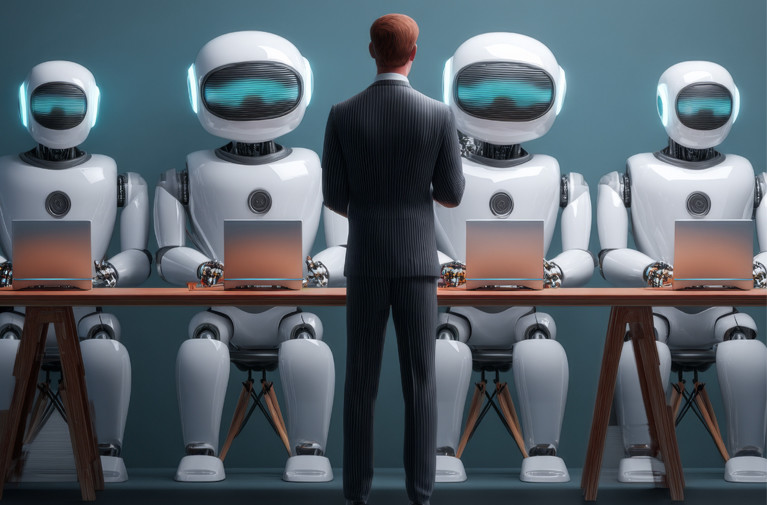Amid AI Ramp-Up, Midlevel Employees Demand Better Laptops and Job Security
San Francisco, CA – September 5, 2025 – As tech companies accelerate their adoption of artificial intelligence (AI), midlevel employees across the industry are voicing a dual concern: the need for better tools, like high-performance laptops, to keep pace with AI-driven workflows, and growing anxiety over job security as automation reshapes the workplace. Despite the promise of AI to enhance productivity, midlevel workers are caught in a paradox—tasked with leveraging advanced AI tools while fearing their roles could be automated.
The Push for Better Tools
Midlevel employees, particularly in tech hubs like Silicon Valley, are increasingly vocal about outdated hardware hindering their ability to utilize AI effectively. Many report that their current laptops, often several years old, struggle with the computational demands of AI tools like code generators, data analytics platforms, and machine learning models. A recent post on X highlighted frustration among workers at a major tech firm, with one employee stating, “We’re expected to integrate AI into everything, but my laptop crashes running basic scripts. Meanwhile, interns get M4 MacBook Pros.”
This sentiment aligns with broader industry trends. A McKinsey report notes that while 99% of companies are investing in AI, only 1% feel they’ve reached maturity in its adoption, underscoring the need for infrastructure upgrades to support employees. Midlevel workers, often responsible for implementing AI-driven solutions, argue that high-performance hardware—such as laptops with advanced GPUs or increased RAM—is essential to meet expectations without compromising efficiency. “We’re not asking for luxury; we need tools that match the job,” said Sarah Kim, a midlevel software engineer at a Bay Area startup.
Job Security Fears Intensify
Beyond hardware, the specter of AI-driven job displacement looms large. A 2025 Stanford University report found that entry-level tech roles have seen a 13% employment decline in AI-exposed occupations, with midlevel roles also facing pressure as companies prioritize senior expertise or automate routine tasks. The New York Times reported that some tech executives have openly discussed reducing midlevel positions, with one stating their startup now employs a single data scientist for tasks that once required a team of 75.
Midlevel employees, typically with three to seven years of experience, are particularly vulnerable. A New York Times analysis suggests that AI enables junior employees to perform midlevel tasks under senior oversight, potentially flattening corporate structures and reducing the need for middle-tier roles. For example, AI tools have transformed coding workflows, allowing midlevel coders to review others’ work or contribute to unfamiliar languages, but this efficiency can reduce headcount needs. “I’m using AI to do my job faster, but I’m also training it to replace me,” said Michael Chen, a midlevel developer at a fintech firm.
Industry Perspectives and Responses
While some industry leaders, like Anthropic’s CEO Dario Amodei, predict significant job losses—potentially half of entry-level white-collar roles within five years—others argue that AI will augment rather than replace workers. OpenAI’s COO, Brad Lightcap, suggested that AI could benefit younger workers by automating routine tasks, though he acknowledged risks for more tenured employees resistant to change. A Washington Post analysis found that AI augmentation currently outpaces automation, offering short-term reassurance but no long-term guarantees.
Companies are responding unevenly. Some, like Databricks, are hiring AI-skilled workers at premium salaries—posts on X claim 22-year-olds with AI expertise are earning seven figures—while others are cutting back. SignalFire’s 2024 data showed a 25% reduction in Big Tech hiring of recent graduates, with AI cited as a key factor. Meanwhile, midlevel employees report mixed signals: some firms are investing in training to upskill workers for AI integration, while others are quietly downsizing. A Computerworld report highlighted a persistent AI talent shortage, suggesting that skilled midlevel workers could remain in demand if they adapt.
Balancing Act for Employers
Tech companies face a delicate balance: equipping employees with the tools and skills to harness AI while addressing fears of obsolescence. “Bosses want AI to cut costs, but they’re realizing you can’t just plug it in and fire everyone,” said Martha Gimbel, an economist at Yale’s Budget Lab. Upgrading hardware, offering AI-focused training, and fostering transparent communication about job security could alleviate tensions. However, with cost pressures mounting, as noted by NBC News, some firms are hyping AI’s potential savings without clear evidence of widespread job cuts—yet.
Looking Ahead
For midlevel employees, the AI ramp-up is a double-edged sword: an opportunity to boost productivity with better tools, but a threat to their roles if automation accelerates. As one X user put it, “The job market just split into two universes: those who master AI and those who don’t.” Companies that invest in both technology and their workforce may retain a competitive edge, while employees who upskill and advocate for resources like better laptops could secure their place in an AI-driven future.
Sources: The New York Times, McKinsey, Stanford University, Computerworld, NBC News, Washington Post, Business Insider, posts on X
